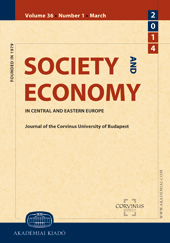Prediction of Success in Post-Communist Societies: Evidence from Latvia and Estonia
Prediction of Success in Post-Communist Societies: Evidence from Latvia and Estonia
Author(s): Mikk Titma, Denis TrapidoSubject(s): Economy, National Economy, Economic development
Published by: Akadémiai Kiadó
Keywords: Latvia; Estonia; transitional societies; success and failure; predicting factors; Latvia;
Summary/Abstract: The article reports results from a four-wave international longitudinal study “Paths of a Generation”representative of young adults in Estonia and Latvia. We looked especially at individual and structural factors predicting success and failure in these transitional societies taken together. We conceptualised success and failure as success group (or status group) membership. By doing so we attempted to capture different channels of “winning”(e.g., entrepreneurial activity or taking managerial positions) and “losing”(e.g., unemployment or employment in the primary sector of economy). The new social stratification structure in those societies is in the stage of formation. On the one hand, it is still influenced by the communist legacy; on the other hand, hierarchies typical for Western market economies are taking shape. Male gender, longer education career and belonging to the titular nation are among major predictors of success. Success group membership, especially being an entrepreneur, is also predicted by high self-evaluation and ambitions recorded as the respondents were 17 years old, as well as by early economic activity. The “losers”among young adults are generally less educated; they tend to have more children, live in smaller settlements and belong to the non-titular nation. Failure is predicted mainly by objective personal characteristics and not by subjective self-evaluation or life plans.
Journal: Society and Economy. In Central and Eastern Europe ǀ Journal of the Corvinus University of Budapest
- Issue Year: 24/2002
- Issue No: 3
- Page Range: 297-331
- Page Count: 35
- Language: English

